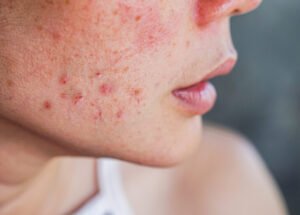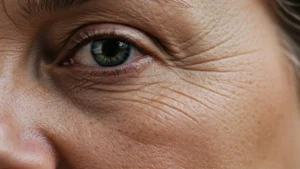Cortisol, known as the “stress hormone,” is essential for survival, but in excess, it accelerates the appearance of wrinkles and skin aging.
In the midst of a stressful day, the body activates a silent defense mechanism: it releases cortisol, the hormone that prepares us to react to danger.
However, when this process is repeated day after day, the price to pay can be reflected in the mirror: premature wrinkles, loss of elasticity, and visibly more fragile skin.
Cortisol, known as the ” stress hormone,” is produced in the adrenal glands and plays a vital role in regulating how the body handles stressful situations. In the short term, it’s essential for keeping us alert, but in excess, it becomes an enemy of the skin.
How cortisol accelerates skin aging
When stress becomes chronic and cortisol levels remain elevated, the body experiences a series of internal changes.
One of the most obvious occurs in the skin: the hormone interferes with the production of collagen, the protein responsible for firmness and support. With less collagen and elastin, the skin loses resistance and weakens, which facilitates the formation of wrinkles and expression lines.
Effects of cortisol on the skin
Specialists highlight several direct impacts of excess cortisol on skin health:
- Loss of collagen and elastin: decreases the firmness and flexibility of the skin, promoting the appearance of wrinkles.
- Dehydration and dryness: the skin retains less water, making it thinner and more fragile.
- Excessive oil production: increases the risk of acne and skin breakouts.
- Chronic inflammation: aggravates diseases such as dermatitis, eczema, or rosacea.
- Slower cell regeneration: delays repair and healing processes.
Stress and skin: a harmful relationship
The impact of stress isn’t limited to the appearance of wrinkles. The accelerated destruction of collagen and elastin makes the skin the main victim of cortisol. Over time, these changes promote sagging and accelerate the skin aging process.
How to protect your skin from cortisol?
Although eliminating stress is impossible, there are measures to minimize its effects on the body, and particularly on the skin. Keeping cortisol levels under control is key to preventing premature deterioration.
According to Dr. Luis Gutiérrez Serrantes, a MARNYS contributor, a balanced lifestyle is essential: a diet rich in antioxidants, regular exercise, adequate rest, and relaxation techniques such as meditation or yoga.
In the dermatological field, cosmetic products with active ingredients that stimulate collagen production—such as vitamin C, retinol, or hyaluronic acid —and aesthetic treatments such as mesotherapy, which help counteract the effects of this hormone on the skin, are recommended.
Cortisol: vital, but harmful in excess
Cortisol is essential for survival, but when it remains elevated for long periods, it becomes a determining factor in skin aging. Its effects on collagen and elastin cause the face to lose firmness and freshness. The key to curbing this impact is adopting habits that reduce stress and protect long-term skin health.























+ There are no comments
Add yours